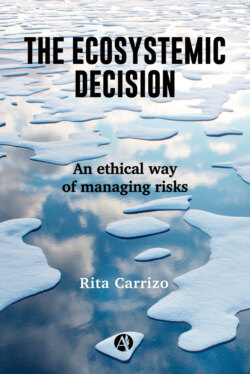Читать книгу The Ecosystemic Decision - Rita Carrizo - Страница 15
На сайте Литреса книга снята с продажи.
The linear decision-maker
ОглавлениеFrom an ecosystemic point of view, humans -in each of the decision-making archetypes presented- could be seen as decision-makers who have not learned to recognise that almost everything that happens since they became the dominant species on the planet is due to their involvement, and that every interaction they make with other humans or human groups and/or with the ecosystem, also makes them the protagonists of what happens as a result. Unfortunately, the linear way of making decisions has not allowed them to appreciate their involvement in the whole process, nor their responsibility for the outcomes they produce and experience. For example, some individuals may judge that they “did nothing” to cause the ozone layer to thin, so they have no reason to take responsibility for considering the issue, helping to repair it, or taking action to help prevent further aggravation. Others might think that, since they did not invent the steam engine or discover fossil fuels or their methods of exploitation, they are not responsible for environmental pollution; or even, since they do not own the companies that produce polluting emissions, they are not responsible for their occurrence.
As Senge said, a linear thinker is only able to see one part of the circle of causality, and then, responsibility is circumscribed to that part as well. However, in the examples shared above, while very few humans alive today could have caused the thinning of the ozone layer, it could be argued that most of them contribute to aggravating the situation through the use of certain types of paint, air conditioning, and fossil fuels, to name a few examples. The same is true for those who believe they have no responsibility for polluting gases; they may not be the producers, but possibly no one is spared from contributing to them, as long as they continue to consume the goods (cars, fuels, cement products, etc.) produced by those who emit them. All participants in the system share responsibility for the outcomes of interactions within it and with other systems, although not all have an equal opportunity to influence a change of course.
In short, the systemic approach seems to provide a partial answer to the question: “Why did we not give up everything the moment we started to realise the consequences?” The linear view, which is only capable of looking at quasi-instantaneous processes of cause and effect rather than circles of causality, responsibility, and systemic delay, is such partial answer. The undesired outcomes affect all of humanity, but many do not yet seem to feel responsible for them, let alone for stopping the machinery of production, not even the main producers of the ecological imbalance.
Such a partial answer, however, seems insufficient to address the root cause of human linear decision-making, a cause that keeps humankind trapped in a way of life in which many of the results obtained are far from desired. A way of life that is widely criticised today, but from which individuals find it difficult to escape; a lifestyle in which the spectrum of risks they are able to assess is only focused on those events that might prevent them from fulfilling the needs and goals they set for themselves, as the HE and the HA would do. It is also an insufficient response to answer questions such as: why did the countries with the highest greenhouse gas emissions not ratify the Kyoto Protocol at the time? Why did some countries refuse to sign the Paris Agreement on climate change in 2016? Or why did the United States formally withdraw from the agreement at the end of 2019?
Coming up with a useful interpretation in order to answer these and similar questions requires drawing on some additional disciplines and perspectives that, together, could also serve to activate self-reflection and awake a protagonist role.
1 Jakobsson, M. et Al. (2017, November 3). Southern African ancient genomes estimate modern human divergence to 350,000 to 260,000 years ago. The American Association for the Advancement of Science, 358,(6363), 652-655. DOI: https://doi.org/10.1126/science.aao6266
2 Martinez, Y. (2014). Neuroscientists identify the role of a gene in the emergence of human language. Tendencias 21.
https://tendencias21.levante-emv.com/neurocientificos-identifican-el-papel-de-un-gen-en-la-aparicion-del-lenguaje-humano_a37066.html
3 World Wildlife Fund. (2018). Living Planet Report - 2018: Aiming higher. http://awsassets.wwf.es/downloads/informe_planeta_vivo_2018.pdf
4 Intergovernmental Panel on Climate Change. (2014). Climate Change 2014: Synthesis Report. Contribution of Working Groups I, II and III to the Fifth Assessment Report of the Intergovernmental Panel on Climate Change. https://www.ipcc.ch/site/assets/uploads/2018/02/SYR_AR5_FINAL_full_es.pdf
5 Noticias ONU (2019, November 26). La ambición del Acuerdo de París debe quintuplicarse para evitar una catástrofe climática. Cambio climático y medioambiente https://news.un.org/es/story/2019/11/1465861
6 World Bank (2019). Understanding Poverty. Overview.
https://www.bancomundial.org/es/topic/poverty/overview
7 United Nations Office on Drugs and Crime. (2019). World Drug Report 2018: opioid crisis, prescription drug abuse expands; cocaine and opium hit record highs.
https://www.unodc.org/unodc/es/press/releases/2018/June/world-drug-report-2018_-opioid-crisis--prescription-drug-abuse-expands-cocaine-and-opium-hit-record-highs.html
8 Botero, E. (2016). Reflection on the concept of economic rationality and the notion of Homo oeconomicus. In Conceptual basis for a crytical analysis of the administrative and economic discourse (pp. 19-53). Ediciones Universidad Cooperativa de Colombia. http://dx.doi.org/10.16925/9789587600438
9 Simon, H. (1957). Administrative behavior. A Study of Decision-Making Processes in Administrative Organization. (2nd ed.). U.S.A.: The Free Press. UK: Collier- Macmillan Limited.
10 de Rosnay, J. (1977). The systemic revolution: a new culture. The Macroscope: towards a global vision. pp. 65. AC.
11 Senge, P. (2006). The Fifth Discipline. The art & practice of the learning organization. (p. 3). Doubleday.
